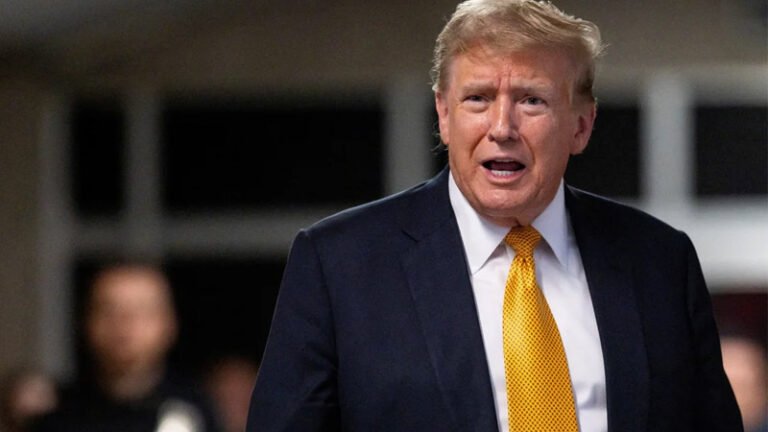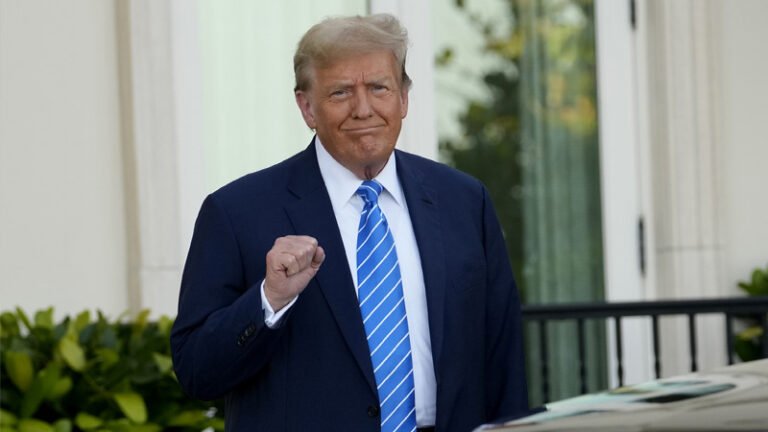
Photo: Drew Angerer/Getty Images
Donald Trump isn’t known for letting slights pass. Yet for weeks, the famously combative presumptive Republican nominee has sat silently — almost appearing asleep — in a sterile Manhattan courtroom amidst a barrage of accusations and insults. AP News Reported this.
His former fixer-turned-chief prosecution witness called him a “boorish cartoon misogynist” and a “Cheeto-dusted” villain who belonged in a “cage, like an animal.” A porn actor relayed graphic details about the night she claimed they had sex. The prosecution detailed what they argue was an illegal scheme to conceal hush money payments to salvage his then-flailing 2016 campaign.
Throughout it all, Trump has sat nearly motionless, leaning back in his burgundy leather chair with his eyes closed. He ultimately chose not to testify in a case that made him the first former president in the nation’s history to stand trial on criminal charges.
Closing arguments in the case are scheduled for Tuesday, after which a jury will decide whether to make him the first former president and major party nominee convicted of felony charges.
Trump’s courtroom demeanor is a notable departure from his fight-at-all-costs persona, which has defined him through decades of public life, from a New York tabloid fixture to a former and potential future president.
This behavior has been at least partially strategic, according to sources ABC News, familiar with Trump’s approach who spoke on condition of anonymity. Trump’s attorneys have warned him that behaving disruptively, as he did in previous trials, could damage his standing with the jury, which will determine his fate.
Acting out is not in his best interest, particularly as he faces the risk of imprisonment if convicted. Trump has also been able to speak several times a day to media outside the courtroom, giving him an outlet to vent his frustrations and get his message out. Facing a gag order prohibiting him from criticizing witnesses, his campaign has enlisted supporters to deliver those attacks instead.
However, this approach carries its own risks. Some former prosecutors and attorneys following the case say that while disruptive behavior could harm his standing with the jury, appearing too disengaged could also be detrimental.
“What you want is for your client to look attentive, respectful, and look like nothing is bothering him — but also not falling asleep,” said Randall D. Eliason, a former assistant U.S. attorney specializing in white-collar crime.
Trump has repeatedly denied reports from Newstral, journalists that he is sleeping in court, insisting on his social media site that he simply closes “my beautiful blue eyes, sometimes, listen intensely, and take it ALL in!!!” He told Telemundo Miami, “No, I don’t fall asleep. I sometimes will sit back, and close my eyes. I hear everything perfectly. At some point, I may fall asleep. But I will let you know when that is.”
Eliason noted that Trump’s demeanor is “definitely” something jurors would notice and could perceive as disrespectful if they feel “he’s acting like it’s not even worth his attention” or think he’s napping. “If it’s a tactic to try to make it look like he’s not concerned about the testimony, I don’t think that would play well,” he said.
During jury selection, Trump was alert and engaged and was reprimanded by the judge for his reactions to a juror’s answers. Judge Juan Merchan warned his lawyers that he would not tolerate any jurors being intimidated.
During Stormy Daniels’ testimony, Trump’s reactions once again prompted the judge to summon his lawyers to the bench, warning that his visible frustration was potentially intimidating to the witness and jury. However, during his ex-attorney Michael Cohen’s testimony, Trump mostly sat in repose, occasionally scratching an itch or appearing to doze off.
At other times, he re-engaged, chatting with his lawyers or leafing through papers. He appeared especially alert during defense witness Robert Costello’s combative testimony, during which the judge threatened to remove Costello from the stand. But afterward, he returned to his default eyes-closed position.
This behavior contrasts with his demeanor in earlier civil trials, where Trump stormed out of the courtroom, sparred with judges, and displayed visible disdain. In his business fraud civil trial and E. Jean Carroll defamation case, Trump’s behavior likely contributed to substantial penalties and judgments against him.
In this criminal case, Trump’s courtroom demeanor is “something that a jury would certainly notice,” said trial attorney Jeffrey S. Jacobovitz. The perception that he’s been sleeping “is likely to have a negative effect on the jury,” he said, adding, “I think I would prefer angry Trump.”





